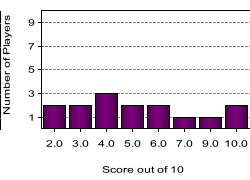Quiz Answer Key and Fun Facts
1. Here is what Owen once said about his poetry. Complete the quote: "I am not concerned with poetry. My subject is War, and the pity of War. The poetry is in the pity. (...) All a poet can do today is____"
2. What is the poem I'm quoting this from called: "I dreamed kind Jesus fouled the big-gun gears / And caused a permanent stoppage in all bolts / And buckled with a smile Mausers and Colts / And rusted every bayonet with His tears..."?
3. "Wear it, sweet friend. Inscribe no date nor deed / But may thy heart-beat kiss it night and day / Until the name grow vague and wear away." What object is being referred to?
4. One of Owen's most impressive poems is "Dulce And Decorum Est," where he describes what war is like, and, after saying something along the lines of "If you had seen what I have seen", ends with the cynical lines: "My friend, you would not tell with such high zest / To children ardent for some desperate glory / The old ______: Dulce et decorum est / Pro patria mori." Fill in the blank.
5. "Futility" describes the death of a comrade-in-arms, far from home. What question does Owen ask in the end?
6. A very unusual poem is the one which starts like this: "She sleeps on soft, last breaths; but no ghost looms / Out of the stillness of her palace wall / Her wall of boys on boys and dooms on dooms". What is it called?
7. "Be slowly lifted up, thou long black arm / Great Gun towering towards Heaven, about to curse / Sway steep against them, and for years rehearse / Huge imprecations like a blasting charm! / Reach at that arrogance which needs thy harm / And beat it down before its sins grow worse." This powerful incantation is the beginning of which poem?
8. In which poem dows Owen recount the story of Abraham and Isaac, but with a different ending?
9. An almost funny poem is "The Letter". It is the letter of a soldier to his wife, but includes comments in brackets, indicating what is going on while the letter is being written. When the soldier writing the letter is hit, he asks a comrade to finsh the letter for him. What is that comrade's name?
10. Owen's masterpiece is without any doubt "Strange Meeting". It follows an English soldier who fell and, beyond life, encounters another dead soldier. They see what they have in common - untimely death, shattered dreams, unfulfilled hopes. Only then do they realize that they once were enemies, and that the other soldier is a German who was killed by the protagonist yesterday. What is the last line of this poem?
Source: Author
PearlQ19
This quiz was reviewed by FunTrivia editor
agony before going online.
Any errors found in FunTrivia content are routinely corrected through our feedback system.

